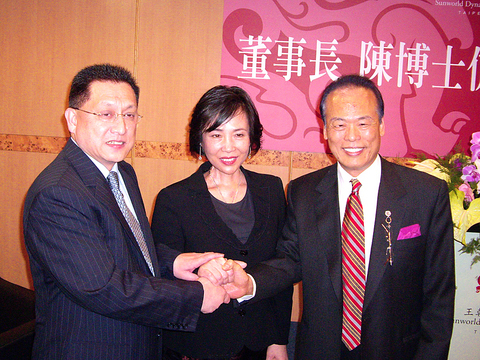After taking over Holiday Inn Asiaworld Taipei in September and renaming it Sunworld Dynasty Hotel Taipei (
"I'm quite optimistic about Taiwan's economy and environment. It doesn't matter whether Taiwan has direct links with China or not. This small island has great potential," said Chen, who built his name and wealth via Sunrider International (
Chen, who usually shies away from the press, yesterday made his first public appearance in Taipei to introduce the hotel's new management team after acquiring Sunworld Dynasty with his wife Chen Oi-lin (陳徐愛蓮), president of Sunrider.

PHOTO: JACKIE LIN, TAIPEI TIMES
Chen last year made his first transition into the hotel industry by buying three hotels in Taiwan and China for over NT$11 billion (US$330 million). He has invested an undisclosed amount in the five-star Sheraton Taipei.
Early last year, Chen took in Tianlun Dynasty Hotel (天倫王朝飯店) and Tianlun Songhe Hotel (天倫松鶴大酒店), both in Beijing, for over NT$4 billion. In May, he secured Holiday Inn Asiaworld Taipei for NT$7.04 billion after three public auctions to sell the poorly performing hotel failed.
These deals were fairly cheap considering their good locations in downtown areas, he said, adding that the firm would continue to hunt for ideal takeover targets in Shanghai, Hong Kong and Taiwan, with possibilities also extending to Japan, South Korea, Australia and South Africa.
"The reason I stepped into the hotel industry is I want to integrate my business with culture and fashion," said Chen, who graduated from the pharmacy department of Kaohsiung Medical University.
With nearly 1 million Sunrider distributors in 40 nations, Chen plans to integrate resources and express his passion for fashion and image through his hotels. He said he will display some of his thousands of Chinese art collections -- currently stored in a museum in California -- in Sunworld Dynasty after an overall refit is completed.
Located at the intersection of Dunhua N Road and Nanjing E Road near Songshan Airport, Sunworld Dynasty was founded by Asiaworld Group (亞世集團) 25 years ago to become the nation's first hotel integrated with a department store.
However, lack of maintenance in recent years made the 750-room hotel appear rundown, which caused it to lose some of its competitive edge.
Chen expected the large-scale renovation -- including the outer walls, guest rooms, restaurants, ballrooms and basement parking space -- to take three years and over NT$2 billion to complete.
"We do not plan to demolish it for reconstruction as the hotel itself has a modern design. But after the face-lift, I'm confident it'll bloom for another two to three decades," Chen said.
He expected Sunworld Dynasty to rake in annual sales of up to NT$1.5 billion, from the current NT$900 million, by upgrading it to a five-star hotel with four-star rates.
In addition, because of his close relations with Sheraton Taipei, these two hotels will refer customers when one is fully booked, he said.
Chen yesterday also introduced the hotel's new general manager, Victor Chou (
He has participated in preparation at the Brother Hotel, The Sherwood Taipei and Ta Shee Resort, as well as management at the Sheraton Taipei.

Sweeping policy changes under US Secretary of Health and Human Services Robert F. Kennedy Jr are having a chilling effect on vaccine makers as anti-vaccine rhetoric has turned into concrete changes in inoculation schedules and recommendations, investors and executives said. The administration of US President Donald Trump has in the past year upended vaccine recommendations, with the country last month ending its longstanding guidance that all children receive inoculations against flu, hepatitis A and other diseases. The unprecedented changes have led to diminished vaccine usage, hurt the investment case for some biotechs, and created a drag that would likely dent revenues and

Global semiconductor stocks advanced yesterday, as comments by Nvidia Corp chief executive officer Jensen Huang (黃仁勳) at Davos, Switzerland, helped reinforce investor enthusiasm for artificial intelligence (AI). Samsung Electronics Co gained as much as 5 percent to an all-time high, helping drive South Korea’s benchmark KOSPI above 5,000 for the first time. That came after the Philadelphia Semiconductor Index rose more than 3 percent to a fresh record on Wednesday, with a boost from Nvidia. The gains came amid broad risk-on trade after US President Donald Trump withdrew his threat of tariffs on some European nations over backing for Greenland. Huang further

Macronix International Co (旺宏), the world’s biggest NOR flash memory supplier, yesterday said it would spend NT$22 billion (US$699.1 million) on capacity expansion this year to increase its production of mid-to-low-density memory chips as the world’s major memorychip suppliers are phasing out the market. The company said its planned capital expenditures are about 11 times higher than the NT$1.8 billion it spent on new facilities and equipment last year. A majority of this year’s outlay would be allocated to step up capacity of multi-level cell (MLC) NAND flash memory chips, which are used in embedded multimedia cards (eMMC), a managed

CULPRITS: Factors that affected the slip included falling global crude oil prices, wait-and-see consumer attitudes due to US tariffs and a different Lunar New Year holiday schedule Taiwan’s retail sales ended a nine-year growth streak last year, slipping 0.2 percent from a year earlier as uncertainty over US tariff policies affected demand for durable goods, data released on Friday by the Ministry of Economic Affairs showed. Last year’s retail sales totaled NT$4.84 trillion (US$153.27 billion), down about NT$9.5 billion, or 0.2 percent, from 2024. Despite the decline, the figure was still the second-highest annual sales total on record. Ministry statistics department deputy head Chen Yu-fang (陳玉芳) said sales of cars, motorcycles and related products, which accounted for 17.4 percent of total retail rales last year, fell NT$68.1 billion, or